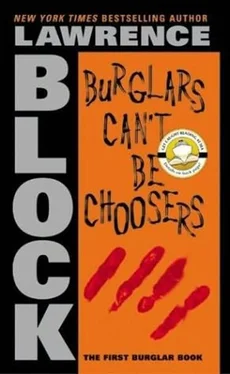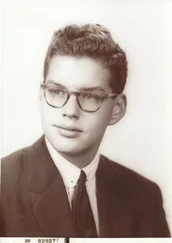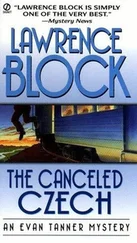“Your famous intuition. I knew you had to be involved to some degree, Ellie. Nobody trusts her intuition that much. You had to have something else to go on.”
“Anyway, you’d find out my name sooner or later. Unless I just disappeared one day. But I wasn’t sure I wanted to. And everything happened so quickly.”
“Right.”
“So now you know the truth. I did a fair job of blowing the whole thing when I almost let us into the wrong apartment, didn’t I?”
“I’d have put it all together anyway.”
“I suppose so.” She looked off into the middle distance, and I guess I did, too. A silence descended and hung around for quite a while. Finally she broke it.
“Well,” she said, “things worked out pretty well after all, didn’t they?”
“In every way but financially, yes. You’re clear, Darla’s clear, and I am no longer wanted for homicide. I’d say things worked out beautifully.”
“Except that you must hate me.”
“Hate you?” I was genuinely surprised at the thought. “Why on earth should I hate you? You may have come up here originally out of curiosity and to make sure you weren’t in danger, but after that you helped me a lot. Not as much as if you had told me all the truth at the beginning, but what kind of fool goes through life expecting honesty in interpersonal relationships?”
“Bernie-”
“No, seriously, I don’t blame you. Why should you have opened up to somebody who might turn out be a murderer after all and who was certainly a convicted felon to begin with? And you did help me a great deal. I couldn’t have straightened things out without your help and I probably wouldn’t have tried. I’d have gotten in touch with a lawyer and tried to work some kind of a deal through Ray. So I’d have to be a complete moron to hate you.”
“Oh.”
“To tell the truth,” I said, “I’m kind of fond of you. I think you’re a little bit nuts, but who the hell isn’t?”
“You know I was involved with Flaxford.”
“So?”
“And you saw that picture.”
“So?”
“It didn’t bother you?”
“Not in the way you mean.”
“How else could it have bothered you?”
“In the sense of hot and bothered,” I said.
“Oh. I see.”
“Yeah.”
“Oh.”
I tipped up her chin and kissed her, and that lasted for a time, and then she sighed and nestled in my arms and said it was funny how things turned out. “And now what happens?” she wanted to know.
“Things keep on keeping on, baby. You go on being an actress and I go on being a burglar. People don’t change. Both of our careers may be slightly disreputable but I think we’re stuck with them. And we’ll see each other, and we’ll see how it goes.”
“I’d like that.”
And I’d see Darla Sandoval, and I’d try to figure out a way to knock off her husband’s coin collection without Darla guessing who did it. And I’d probably try to put my apartment back together again, and maybe the neighbors would overlook my alleged occupation in view of the fact that I confined my operations to the East Side where the momsers had it coming. And I’d probably go on playing poker and watching an occasional baseball game and pulling jobs when I had to. It wouldn’t be perfect, but who leads a perfect life? We’re all imperfect creatures leading imperfect lives in an imperfect world, and all we can do is the best we can.
I said some of this to Ellie, if not all of it, and we cuddled together, and at first it was just nice and comfy and gentle, and then it got to be a little more than that.
“Let’s go to bed,” she said.
I thought that was a great idea. But first I went and made sure the doors were locked.
In January of 1976 I was in a motel on the outskirts of Mobile, Alabama, trying to write a book. Six months earlier I’d left New York in a rusted-out Ford wagon, bound for California and in no rush to get there. I was going through what the British call a bad patch. I kept starting books and abandoning them after thirty or forty or fifty pages, unable to think of a reason for the characters to Go On.
In Mobile I wrote about a burglar who gets in touch with the detective who arrested him years ago. The burglar’s out now, and up to his old tricks, and has had the ill fortune to happen on a murder scene, at once becoming its leading suspect and a fugitive from justice. He wants the detective to clear him. I wrote the opening chapter, took a good look at what I’d written, tore it up and threw it out and drove to Sardis, Mississippi. Don’t ask why.
Two months later I was in LA, finally, living in a place called the Magic Hotel. I couldn’t figure out what the hell to do. For over fifteen years I’d made my living writing, and now I seemed unable to do that.
Don’t rule out crime, a little voice said.
Crime had much to recommend it. You didn’t have to cobble up a resumé or provide references. There were no forms to fill out, no taxes and Social Security withheld from your pay. You just took money and ran.
And suppose you got caught? Well, for heaven’s sake, they fed you and clothed you and housed you. Not the worst thing that could happen to a person, was it?
Hmmm.
But what kind of crime could I possibly commit? Nothing violent, certainly. Nothing where I might be called upon to hurt somebody, or, worse yet, where somebody might be called upon to hurt me. Nothing with guns or sharp objects. Nothing like con games, either, that involved duplicitous interaction with others. Indeed, nothing that involved any interaction with others. I didn’t seem to be all that good at interaction just then.
Burglary, I thought. Go in when nobody’s home, get out before they return. You work alone, and in pleasant surroundings-Robin Hood, after all, had just shown good sense in stealing from the rich. You avoid all human contact. You don’t shoot anyone, and no one shoots you.
How seriously did I entertain the notion? Beats me. I did go so far as to try to learn to open my motel-room door without the key, utterly ruining a credit card in the process. (No great loss, that. That card had long since ceased to open any doors for me.)
Then I thought about the plot notion I’d gotten nowhere with back in Mobile. Maybe if I lost the detective and just told the burglar’s story, maybe something would come of it.
So I sat down at the typewriter to see what would happen.
I never thought it would come out funny. The notion I had in mind seemed like pretty serious business, but on the very first page Bernie appeared full-blown, like Athena from the brow of Zeus. (Well, maybe not much like Athena. And maybe from somewhere other than the brow…)
I wrote three or four chapters and a vague outline. All I needed was a title, and I found that while I was proofreading. Burglars can’t be choosers, Bernie mused, and I looked up, startled. I didn’t remember writing the line, but I knew a title when I saw one.
I sent it to my agent, who sent it to Lee Wright at Random House, who sent me a contract. I went back to work on the book. In July my kids came out to LA to spend the summer with me. They joined me for a month at the Magic Hotel, and then we spent August driving back east. Now and then we’d stay someplace for several days in a row so that I could get in some work on the book. One place we stopped was Yellow Springs, Ohio, where we stayed with my friends Steve and Nancy Schwerner. I talked to them about the book and said I was having problems with the solution. “Oh, that’s easy,” Steve said, and told me who he figured had dunnit. I decided he was right.
I dropped the girls with their mother in New York and wound up finishing the book in Greenville, South Carolina. (Don’t ask why.) I was very pleased with the way the book had turned out, but I never thought I’d be writing anything else about Bernie. Shows what I know.
Читать дальше












